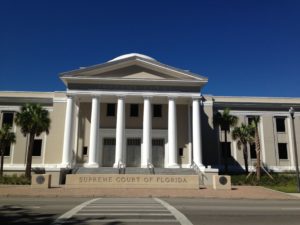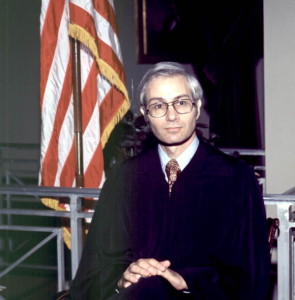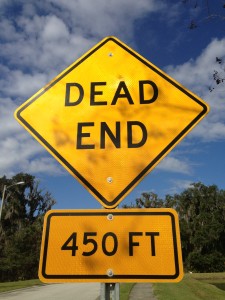You Used Daubert at Trial but Now it’s Frye? Here’s What the Appellate Court Might Do. (UPDATED–IT’S DAUBERT AGAIN!)
***AUTHOR’S NOTE: We published this article on May 20, 2019. On May 23, 2019, the Florida Supreme Court did a completely unexpected about-face and adopted Daubert, receding from its prior opinions rejecting Daubert and rejecting the legislature’s amendment of section 90.702. You can read the full opinion here: https://www.floridasupremecourt.org/content/download/525509/5838164/file/sc19-107.pdf
We’ll follow up with an updated post once we see how the districts change their response to pending appeals on this issue. In the meantime, the below information will still be helpful for understanding where this all came from, and to make an educated guess as to where your case will end up. For now, if you’re in the trial court, use Daubert again (sheesh)!
Jared
__________________________________________________________________
So you and your trial court relied on the current version of section 90.702, Florida Statutes, and applied the Daubert test to determine the admissibility of a new or novel expert opinion. But now that your case is on appeal, the Florida Supreme Court has said that Daubert never applied and the Frye test applies in Florida. What will happen to your case on appeal? Two decisions from two Florida districts give us some hints.

The supeme court’s recent reaffirmance of Frye is requiring districts to develop methods for handling cases founded on Daubert.
A brief history of the Daubert/Frye issue in Florida
First, some brief background (which you probably already know). Frye v. United States, 298 F. 1013 (D.C. Cir. 1923) has long provided the test for admissibility of expert opinion in Florida and federal courts. In Daubert v. Merrell Dow Pharmaceuticals, 509 U.S. 579 (1993), the United States Supreme Court held that a new test would apply for federal courts. But Florida courts stuck with Frye.
In 2013, the Florida Legislature amended section 90.702, Florida Statutes, to incorporate Daubert. But the Florida Supreme Court remained silent on the amendment for years and, in Florida, only the judiciary can formally adopt procedural rules. So Florida trial and appellate practitioners alike were left uncertain–should we use Daubert or Frye?
The intermediate appellate courts too were left without much guidance. The Fourth District held that it would apply the new statute–Daubert–because “statutes are presumed to be constitutional and are to be given effect until declared otherwise.” Crane Co. v. DeLisle, 206 So. 3d 94, 100 n. 7 (Fla. 4th DCA 2016)[.pdf]. Most of the Fourth DCA’s sister districts also applied Daubert. See id. (listing cases from the First, Second, and Third Districts).
Well, in 2018, the Florida Supreme Court reviewed the Fourth District’s opinion and declared the statutory revision to section 90.702 unconstitutional, thereby reaffirming that Frye is the test to apply in Florida. Delisle v. Crane Co., 258 So. 3d 1219, 1229 (Fla. 2018)[.pdf].
What happens to all the pipeline cases on appeal? It depends.
What happens to all the appeals from judgments pre-dating DeLisle, where the trial courts appropriately relied on the statute and the intermediate appellate decisions and applied Daubert?
Shortly after the supreme court issued its Delisle decision, the First District confronted this situation in D.R. Horton, Inc. – Jacksonville v. Heron’s Landing Condo. Ass’n of Jacksonville, Inc., 44 Fla. L. Weekly D109, 2018 WL 6803698 (Fla. 1st DCA Dec. 27, 2018)[.pdf]. Importantly, in Delisle, the supreme court had also reaffirmed that a Frye analysis is only required “when an expert attempts to render an opinion that is based upon new or novel scientific techniques.” Id. at *4. By contrast, in D.R. Horton, “the trial court, albeit in the context of its Daubert analysis, found that Appellee’s experts used a scientifically reliable and peer-reviewed methodology that was the industry standard.” Id. at *4. In other words, there were no new or novel scientific techniques at play. Consequently, the First District held there was no need to remand for a Frye analysis–there was no legal basis for the appellate court to hold that admitting that expert’s opinion was invalid.
More recently, in Kemp v. State, 4D15-3472, 2019 WL 2083045 (Fla. 4th DCA May 8, 2019)[.pdf], on rehearing, the Fourth District held that use of the Daubert standard required remand for a Frye hearing. There, the State sought to introduce an expert that asserted he could determine whether a car was braking at the time of an accident based on the location and “arc[ing]” character of damage on the cars involved.
The trial court never considered whether this was “new or novel” under the Frye test because Daubert applied at that time. However, because the appeal was in “the pipeline” when DeLisle issued, the Fourth District was to apply Frye–if Frye applied at all to the facts of the case before it.
The Fourth District recognized that Frye would only apply if the scientific principles were new or novel, but unlike in D.R. Horton, the appellate court could not tell from the record. Hence, it remanded for the trial court to determine the matter. The court also ruled that, even if the trial court found the matter was “pure opinion” testimony and Frye did not apply, the trial court should still determine “whether the expert had training and experience in the specific method he used to reach his conclusions.” The court ruled that if the State failed its burden to prove the admissibility of the expert’s opinions, the court should grant a new trial for the defendant. If the State prevailed on proving the opinions admissible, the court should reinstate the defendant’s convictions and sentences.
The legal battleground for appeal will be whether or not the type of expert opinion provided is subject to Frye.
What we can gather from these opinions is that a case impacted by an expert opinion admitted under the Daubert standard will probably be reversed for further proceedings to determine admissibility under Frye, unless the opinion is of a type not subject to a Frye standard or the record already reveals the answer under Frye.
Thus, the argument for an appellee seeking to uphold a judgment based in part on testimony admitted under Daubert is that either the scientific principles upon which the expert’s opinion was based were not new or novel, or that the trial court made sufficient findings to demonstrate the Frye test was satisfied (even if not explicitly referenced). Both of these arguments are effectively identical to a harmless error analysis–even though the trial court applied Daubert, the application of that test had no impact on the outcome of the case.
Meanwhile, an appellant seeking reversal should argue that the expert’s opinion is based on new or novel scientific principles–so Frye applies–and the record does not demonstrate that the expert’s opinion satisfies the Frye test. And, as in most appeals of both civil and criminal appeals, the appellant should argue that it is the appellee’s burden to prove the error did not have an effect on the verdict (read more about this here).


